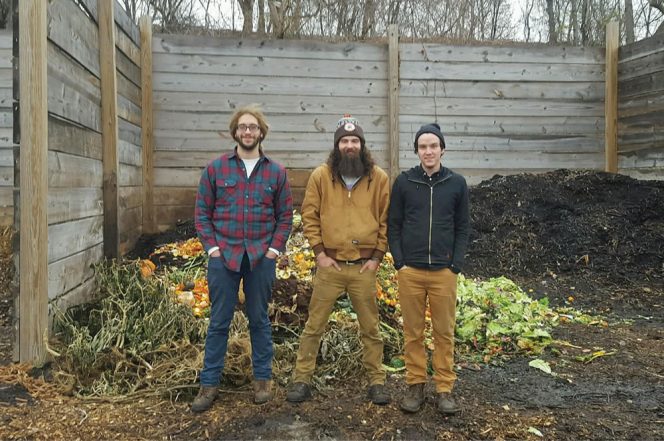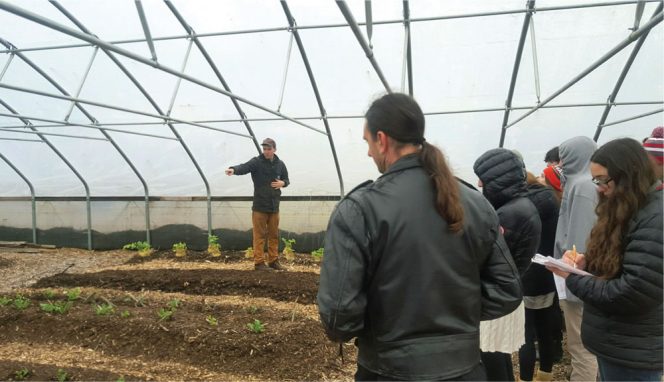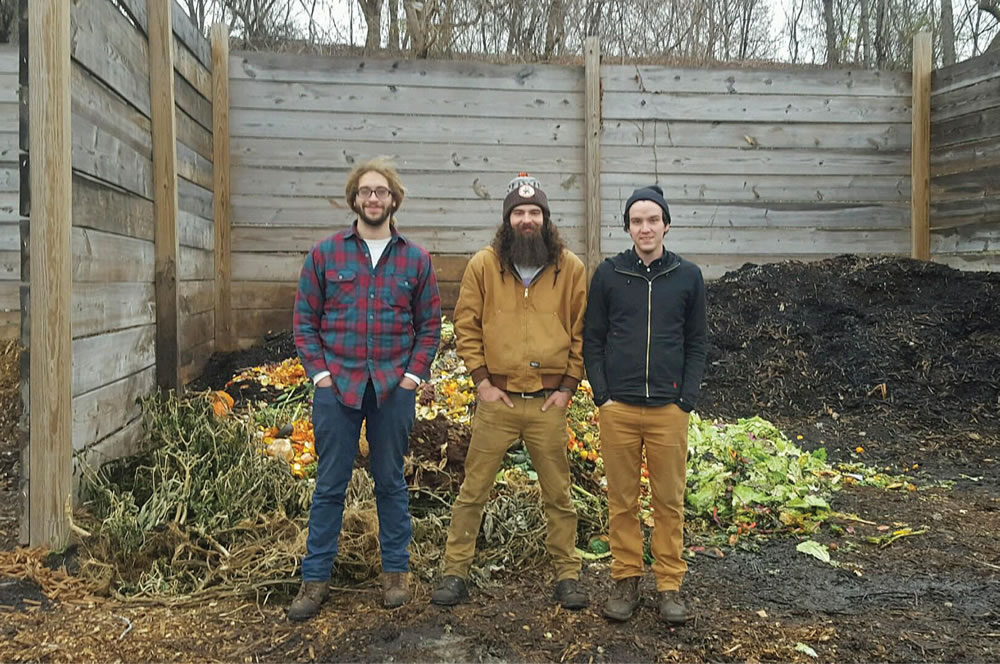Cleveland’s Rust Belt Riders started out with bikes and trailers, and gradually expanded to cart-based food scraps collection to service a growing number of commercial enterprises.
Claire Siegrist
BioCycle May 2016

Rust Belt Riders (from left to right) Jesse Williams, Michael Robinson and Daniel Brown stand in front of one day’s worth of collected food scraps at the Rid-All Green Partnership farm. Photo by Alison Tanker
The idea for RBR was born out of the depleted soils in new community gardens in and around Cleveland. There are over 200 community gardens, many of which were built on land from demolished abandoned homes. These sites face many soil challenges, which gardeners and farmers were trying to remedy by purchasing compost. RBR was created to provide a financially sustainable solution to urban gardeners and the material needed for soil remediation.
Bikes, Van And Dropoff
The company received $2,500 in start-up capital through a crowdfunding campaign sponsored by the Detroit Shoreway, a community development organization in Cleveland. RBR began its organics collection service using bikes with custom-made trailers. Roughly 75,000 lbs of vegetative food scraps were collected using the bike trailers. These bikes prompted a conversation in the community about responsible food scraps management, and demand for RBR’s service increased. A $20,000 investment from the SEA Change business incubator enabled RBR to procure a cargo van in December 2014 to collect more materials, service a wider range of clients, and utilize a variety of composting systems —backyard/personal bins, three-bin pallet systems (often used in community gardens), passively and actively aerated systems and even institutional composting facilities.
RBR had tried to roll out a residential collection service, but found it difficult to get enough density to make it cost-effective for both residents and RBR. In collaboration with Cleveland’s Gordon Square Farmer’s Market, RBR received a $3,550 grant from the Cleveland Climate Action Fund to roll out a residential dropoff service at the farmer’s market. Residents can bring their vegetative food scraps to RBR at the farmer’s market from June to September. For every two pounds of food scraps, residents can get a $1 voucher (up to $20) to spend at the farmer’s market. During the 2015 season, 150 people participated in the program, which totaled 2,000 lbs of fruit and vegetable trimmings. RBR hopes to add dropoff sites at other farmer’s markets this year.
Since June 2015, RBR has been collaborating with Rid-All Partnerships, an urban farm working to bring healthy food to area businesses. Rid-All has four hoop houses and two greenhouses, with one dedicated to aquafarming black talipia. It is also the regional training center for Milwaukee-based Growing Power. In its current capacity, RBR collects vegetative organics only from locally owned restaurants, coffee shops, juice bars, grocery stores, universities. In addition to the urban farm and community gardens, it utilizes Kurtz Brothers’ (Independence, OH) and Grace Brothers’ (Huron, OH) composting sites. Grace Brothers also accepts compostable serviceware from events serviced by RBR.

Rid-All, an urban farm in Cleveland, has four hoop houses and two greenhouses. Compost made from vegetative food scraps dropped off by Rust Belt Riders is used on the farm.
Service Logistics
When a new client signs up for service, one of the three Rust Belt Riders provides a waste audit to determine frequency of service and training required for staff. Clients typically have their organic scraps picked up once a week, but service frequency can be customized based on the business’ needs. Clients are charged by volume of waste produced.
During a pickup, RBR replaces full 5-, 17- or 64-gallon collection containers with clean bins lined with plastic garbage bags. RBR uses liners so as not to increase the service cost associated with hand washing the bins. Riders inspect each tote for contaminants. If there are visible contaminants, the Rider will enter the restaurant to talk to employees about limiting contamination. Brown notes that “inspecting and providing ongoing education is key to a clean organics stream.” RBR is planning to switch from its current cargo van to a 15- to 25-foot box truck to service 64-gallon toters from institutional partners. “We will continue using our cargo van to service existing clients,” he adds.
Although RBR specializes in collecting organics for diversion to composting, it plans to develop programs with food shelters, farmers, and anaerobic digestion companies to offer additional services to clients whose goals are to feed people, feed animals, and produce energy in addition to generating compost. Currently, it is working with Spice Kitchen and Bar to create an animal feed suitable for chickens.
A logistics and data tracking system is in place to calculate businesses’ environmental and social impact. Currently, RBR calculates the total tonnage of waste diverted from its clients as well as the amount of compost those organics produce. In the future, RBR will explore ways to quantify the greenhouse gas offsets, amount of energy produced (if digesters are utilized), and number of animals fed.
RBR plans to cross the threshold from small restaurants to chain grocery stores to hospital systems in a 12-month timeframe. Robinson and Brown recently hired a third staff member, Jesse Williams as Director of Sustainability, to help expand operations and data tracking capabilities.
Claire Siegrist is a Contributing Editor to BioCycle.










